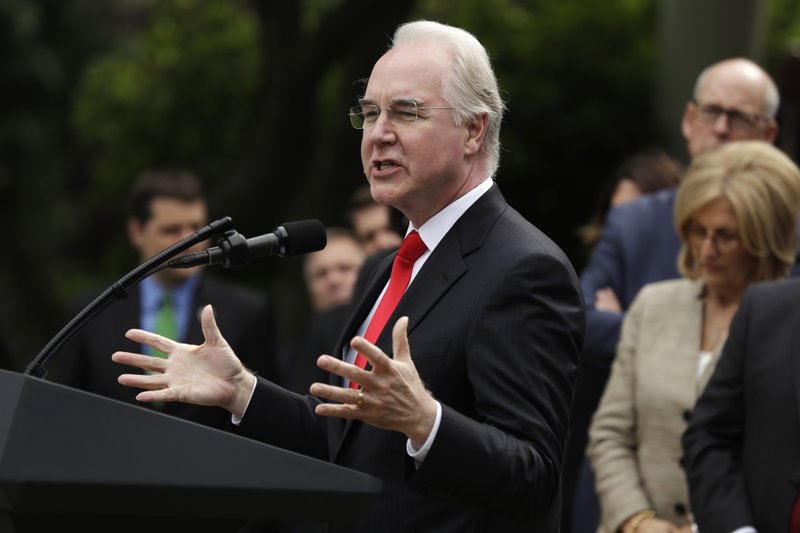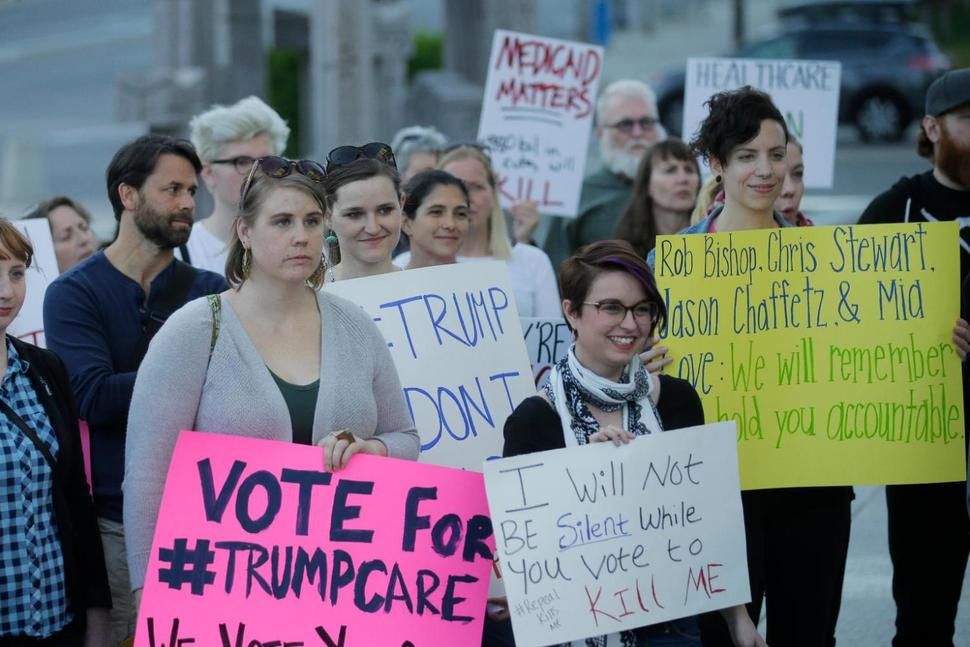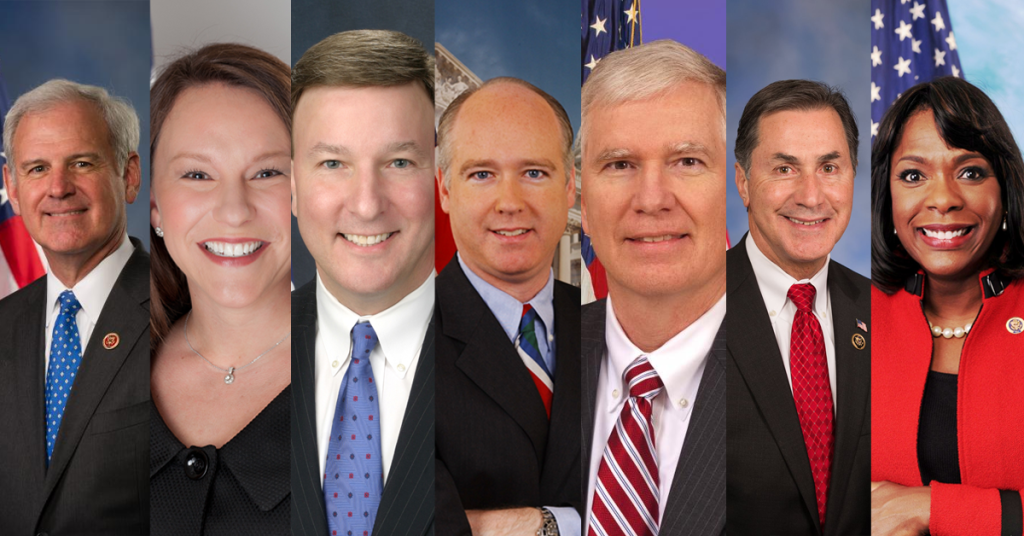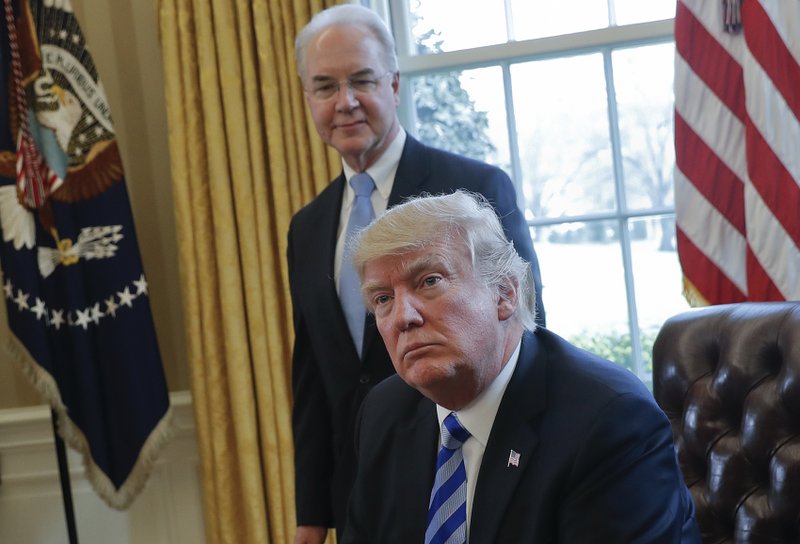Health care fight shifts to Senate, where GOP wants a reboot

It took blood, sweat and tears for Republican leaders to finally push their health care bill through the House last week. Don’t expect the process to be less arduous in the Senate, though more of the angst in that more decorous chamber will likely be behind closed doors. No one expects a new bill to be written quickly, but Senate Majority Leader Mitch McConnell, R-Ky., has started a process for producing one. Republican senators have made clear their measure will differ markedly from the House legislation, which has drawn withering criticism from Democrats who see it as a pathway to winning a House majority in the 2018 elections. “This process will not be quick or simple or easy, but it must be done,” McConnell said Monday. MCCONNELL’S WORKING GROUP McConnell dislikes surprises and drama. Both characterized the House’s chaotic four months of work on its bill, which saw revolts by conservatives and moderates derail initial versions and humiliate President Donald Trump and Speaker Paul Ryan, R-Wis. McConnell has included himself in a group of 12 GOP senators essentially tasked with privately producing a bill that can pass the Senate. Republicans control the chamber 52-48. Democrats are virtually certain to unanimously oppose the Republican effort to repeal much of President Barack Obama’s health care overhaul. So Republicans are using a special process preventing a Democratic filibuster that would require 60 votes to end. McConnell will need 50 GOP votes to pass a bill, a tie Vice President Mike Pence could break. That means McConnell can lose just two Republicans, so his group has a strategically shaped membership. THE GROUP’S ROSTER Sens. Lamar Alexander, R-Tenn., Mike Enzi, R-Idaho, and Orrin Hatch, R-Utah, chair pivotal committees. Sens. Rob Portman, R-Ohio, and Cory Gardner, R-Colo., are from states that used Obama’s law to add hundreds of thousands of beneficiaries to Medicaid, an expansion they want to protect but the House bill would end. Gardner chairs the Senate GOP’s campaign committee. Sens. Ted Cruz, R-Texas, and Mike Lee, R-Utah, are conservative firebrands who represent states that didn’t expand Medicaid but want additional funds for that program. Sens. John Cornyn, R-Texas, John Thune, R-S.D., and John Barrasso, R-Wyo., are in the Senate GOP leadership, and Tom Cotton, R-Ark., is an ambitious up-and-comer who frequently criticizes the House measure. Democrats and liberal activists have lambasted McConnell for appointing a group with no female members. POSSIBLE CHANGES Portman is among Republicans whose states dislike the House’s Medicaid cuts because they’d face a wave of constituents losing coverage under the health care program for the poor. The House would end the extra federal money states get for new beneficiaries under Obama’s Medicaid expansion by 2020, and some GOP senators want a delay. Much Medicaid money is used to combat the illegal use of addictive opioid drugs. That’s another reason for GOP senators from hard-hit Midwestern and Northeastern states to oppose such cuts. Obama’s law helps millions buy private insurance with federal subsidies geared to income and policy premiums. The House instead links its aid to age, with older people getting larger tax credits. Thune and others want to shift the subsidies more generous to lower earners. Cruz said House conservatives won “a positive improvement” with provisions letting states get federal waivers so insurers can charge some people with pre-existing conditions higher premiums, and letting states decide which medical services insurers must cover. He said “considerably more work” was needed to lower premiums. In addition, the filibuster-free process Republicans are using requires that legislative provisions be related to raising or decreasing the federal deficit, and not primarily driven by policy changes. Conservative health care analyst James Capretta says the odds for survival “are low” for House language allowing state waivers for higher premiums on people with pre-existing conditions. Also in jeopardy: a provision forbidding consumers to use federal subsidies to buy insurance covering abortion. The Senate parliamentarian will decide whether provisions must be stricken from the bill. The Senate could override that with 60 votes. POLITICAL ERUPTION The pro-Democratic group Save Our Care is running ads in 24 districts whose GOP House members backed the bill asking, “How could you do this to us?” Obama urged lawmakers to use “courage” to protect health care for poorer Americans, a rare public comment on public policy since leaving office. Underscoring political sensitivities, critics attacked Rep. Raul Labrador, R-Idaho, for saying at a town hall meeting that “nobody dies” from lack of health care. He later said that “wasn’t very elegant.” Republicans are advertising too. The American Action Network, with links to House GOP leaders, is advertising nationally and in Ryan’s district promoting the bill. Sen. Bill Cassidy, R-La., was set to appear on ABC’s “Jimmy Kimmel Live” after saying any GOP bill must pass “the Jimmy Kimmel test.” The talk show host last week delivered a tearful monologue describing life-saving heart surgery his newborn son had received and saying lawmakers must help people afford health care. LOOKING AHEAD The nonpartisan Congressional Budget Office is expected to release its analysis of the House bill this month. It projected an earlier version would toss 24 million people off health coverage, a damaging blow that made it harder for House Republicans to pass their bill. No one is certain when the Senate might approve its bill, though some following the process think that could come by July 4. Republished with permission of The Associated Press.
Bradley Byrne: Big breakthrough on repealing Obamacare

The Affordable Care Act, or Obamacare, is failing the American people by driving up costs and limiting options for families. President Donald Trump and the Republican controlled Congress have pledged to make repealing and replacing Obamacare a top priority. Well, we had a major breakthrough last week when the House passed the American Health Care Act. I voted in support of this legislation to repeal Obamacare and replace it with a system that gets the federal government out of the way. Americans deserve an accessible and affordable health care system that promotes quality care and peace of mind. Rather than top down, one-size-fits-all insurance plans mandated by the government, we need innovation and competition in our health insurance market to drive down costs for families. That is exactly what the American Health Care Act does. The bill repeals the individual and employer mandate penalties to allow workers, families, and employers greater flexibility to find health care plans that actually work for them. For low and middle income families who do not receive health insurance through a government program or their employer, the bill offers monthly tax credits to help purchase affordable coverage. The core focus of the American Health Care Act is to drive down costs and repair damage done to the overall insurance markets by Obamacare. Beginning in 2018, the bill provides immediate funding to help calm the individual market and lower premiums. Specifically, the bill contains a premium stability program modeled after the successful program enacted in Maine. In Maine, individuals in their 20s saw premium savings of nearly $5,000 per year and individuals in their 60s saw savings of more than $7,000 a year. As premiums dropped, younger and healthier individuals entered the market. This increased total enrollment in Maine and saved their citizens thousands of dollars a year on their health insurance. Such savings are in stark contrast to what we have seen under Obamacare. Our commonsense bill also reforms health savings accounts (HSA) to make it easier for families to save for medical care. Even more, the bill fundamentally reforms Medicaid and cuts about one trillion dollars in taxes. Some in the liberal media have attempted to distort the truth about the American Health Care Act in an effort to protect Obamacare, so I want to clear up some of the misinformation. First, the bill specifically prohibits insurance companies from denying coverage to anyone with pre-existing conditions. The bill also continues to require insurance companies to allow young adults up to the age of 26 to stay on their parents’ insurance, maintains the ban on lifetime or annual limits, and prevents insurance companies from charging women more than men. The House also passed a bill making crystal clear that every provision of the American Health Care Act will apply to Members of Congress and our staff. Members of Congress should not be held to a different standard than other Americans. In a victory for those of us who are pro-life, the bill blocks government funding of any kind from going to Planned Parenthood and redirects that funding to community health centers, which are much more plentiful and do not provide abortion services. I thoroughly read and analyzed the American Health Care Act before voting in favor of it on May 4th. Passing this bill is a huge step toward fixing our health care system and rescuing the American people. The bill now moves over to the Senate, where it will likely undergo additional changes. I look forward to following the process as it moves forward, and I encourage you to do the same. • • • Bradley Byrne is a member of U.S. Congress representing Alabama’s 1st Congressional District.
Senate wary on ‘Obamacare’ repeal, bumpy path ahead

Republicans are claiming a triumph by pushing their legislative centerpiece scuttling much of President Barack Obama‘s health care law through the House. It was a perilous journey, and its Senate pathway will be at least as bumpy with little doubt the measure will change, assuming it survives. Thursday’s 217-213 House passage — with 20 GOP defections — was preceded by several near-death experiences for the legislation, even though repealing Obama’s statute helped guide Donald Trump‘s presidential run and multitudes of GOP congressional campaigns. And that was in a chamber Republicans control 238-193. Had just two additional Republicans voted “no,” the measure would have lost because bills need majorities to pass. Now, Republicans must try maneuvering the measure through a Senate terrain that is different politically and procedurally from the House. “We must manage expectations and remain focused on the art of the doable as we move forward,” said Senate Finance Committee Chairman Orrin Hatch, R-Utah, among several cautionary statements issued by Senate Republicans after the House vote. The House bill would end the Obama law’s fines on people who don’t purchase policies and erase its taxes on health industry businesses and higher-earning people. It would dilute Obama’s consumer-friendly insurance coverage requirements, like letting states permit insurers to charge higher premiums for customers with pre-existing medical conditions. The measure would replace Obama’s federal subsidies for lower-income insurance buyers with tax credits geared to consumers’ ages. And it would cut Medicaid, the health insurance program for the poor and disabled, including ending extra federal payments 31 states are accepting to expand Medicaid to cover more people. The notoriously understated Senate Majority Leader Mitch McConnell, R-Ky., lauded the House bill as “an important step” to erasing Obama’s law but left the door open to changes. “Congress will continue to act on legislation to provide more choices and freedom in health care decisions,” McConnell said. The House bill was written by Republicans representing districts often drawn to incorporate strong majorities of GOP voters. Senators represent entire states, and many tend to reflect more pragmatic views than their House colleagues. Several come from northeastern and Midwestern states with large numbers of low-income people receiving Medicaid. Many of the 31 states that accepted Obama’s expansion of that program are led by GOP governors, and senators have no interest in cutting their states’ funds and taking coverage away from voters. Republican senators also represent states ravaged by deaths caused by opioid abuse. The House measure would let states escape Obama’s requirement that insurers cover anti-drug services. “I’ve already made clear that I don’t support the House bill as currently constructed,” said Sen. Rob Portman, R-Ohio. He cited its Medicaid cuts, including for treating people with drug problems, and said he’d make sure that “those who are impacted by this epidemic can continue to receive treatment.” In March, Portman joined three other GOP senators in opposing Medicaid cuts in an early version of the House legislation. In a letter to McConnell, they wrote that the measure “does not provide stability and certainty for individuals and families” who use the program. Sen. Susan Collins, R-Maine, said the House bill poses “more questions than answers about its consequences.” She said there should be “no barrier for coverage” for people with pre-existing medical conditions and that the House’s tax credits “do not adequately take into account income levels” or regional differences in health costs. Collins and Sen. Lisa Murkowski, R-Alaska, have opposed cutting federal money for Planned Parenthood. The House bill blocks federal payments for a year to the organization, which provides abortions but doesn’t use federal funds for them by law. Other senators are also seeking changes. No. 3 Senate GOP leader John Thune of South Dakota is working on a plan to skew the bill’s tax subsidies more toward lower-income people. States that did not expand Medicaid under Obama’s law are looking for additional funding for their programs. Sen. Lindsey Graham, R-S.C., whose state did not enlarge Medicaid, said he would not back a health care bill “that rewards people for taking Medicaid expansion at the expense of those who did not.” Then there are senators like Ted Cruz of Texas and Rand Paul of Kentucky, former presidential candidates who seldom back away from fights and have already signaled they’re looking for changes. The Republican edge in the Senate is just 52-48. Using special rules, the Senate could pass its version of the bill with just 50 votes and rely on Vice President Mike Pence to break a tie. But that means they can lose just two GOP senators assuming Democrats uniformly oppose scrapping Obama’s signature domestic achievement. Those same bylaws bar provisions that aren’t chiefly aimed at federal spending or revenue, meaning some House language dealing strictly with policy changes could fall out. “The Senate will now finish work on our bill, but will take the time to get it right,” said Sen. Lamar Alexander, R-Tenn. He chairs the Senate health committee. Republished with permission of The Associated Press.
GOP health plan spurs sick to #IAmAPreexistingCondition

Concerns about coverage for Americans with pre-existing conditions under the Republican health care bill are prompting some people to tell their personal stories on Twitter. At the “IAmAPreexistingCondition” hashtag, Twitter users describe how the proposed law, approved by the House on Thursday, could affect them or family members dealing with serious illnesses. Some describe suffering from cancer, hereditary diseases or post-traumatic stress disorder brought on by combat. Under the House proposal, states would be able to get federal waivers to allow insurers to charge higher premiums to people with pre-existing illnesses who have let their coverage lapse. The bill includes billions of dollars more to help these people, but experts say it’s unlikely to be enough. Republished with permission of The Associated Press.
Alabama lawmakers discuss their votes to repeal Obamacare

The U.S. House of Representatives on Thursday approved a bill to repeal and replace major parts of the Affordable Care Act, better known as Obamacare. On President Donald Trump‘s 105th day in office, H.R. 1628: American Health Care Act (AHCA) of 2017, was narrowly approved 217-213. All Democrats, including Alabama’s own 7th District U.S. Rep. Terri Sewell, and a group of mostly moderate Republican holdouts voted against the bill. Passing the American Health Care Act is the first of a three-step plan by Republicans in Congress and the Trump Administration to repeal and replace Obamacare. Upon enactment of AHCA, Health and Human Services Secretary Tom Price will begin using his authority to unravel the web of Obamacare rules and regulations that drive up patient costs. Finally, Congress will take up stand alone legislation to further bring down costs through bipartisan proposals such as allowing insurance competition across state lines and health care portability. The bill now heads to the U.S. Senate for consideration, where it expected to modified significantly. Here’s what the Alabama delegation had to say about their votes: Alabama 1st District U.S. Rep. Bradley Byrne: Today, I voted to repeal Obamacare and replace it with a health care plan that actually lowers costs and gets the federal government out of the way. Importantly, the bill continues to ensure protections for people with pre-existing conditions. It also cuts taxes, defunds Planned Parenthood, and fundamentally reforms Medicaid. To be clear, I understand additional changes to the bill may be necessary as the bill moves over to the Senate, but today was a step in the right direction toward rescuing the American people from the failures of Obamacare. Alabama 2nd District U.S. Rep. Martha Roby: For seven years I have promised my constituents that I would repeal and replace Obamacare. A month ago I sat in the Oval Office and told the President of the United States that I was with him and that I would help get this Obamacare repeal bill through the House of Representatives. Today we were finally able to deliver on that promise in a meaningful way. Obamacare is crumbling as we speak. Premiums are skyrocketing, deductibles are through the roof, and people are being hurt because they can’t afford care. That’s why we are repealing this failed law and replacing it with a patient-centered system that lowers costs, increases choices, and isn’t run by the government. Alabama 3rd District U.S. Rep. Mike Rogers: No public comment at this time. Alabama 4th District U.S. Rep. Robert Aderholt: Today I voted for, and the House passed, what the Republicans have promised to do for the past seven years: repeal and replace Obamacare. Contrary to claims in the media, doing nothing was not an option. Obamacare is failing us and premiums are getting worse, not better. Americans continue to see their healthcare options dwindle. Obamacare has also led to more expensive insurance that Americans cannot afford to use – higher premiums and higher deductibles. Today’s vote addresses these issues head-on. This bill ensures that individuals with preexisting conditions will continue to have insurance coverage. There is also assistance for older, rural and poor seniors included in this bill. In addition, today’s vote repeals all of the Medicaid funds from Planned Parenthood and instead redirects this money to the Federally Qualified Health Centers (FQHCs). This amounts to 90% of the federal funds received by Planned Parenthood. Alabama 5th District U.S. Rep. Mo Brooks: While today’s health care legislation falls short of the full ObamaCare repeal that I called for and believe in, a partial repeal does more good for working American families than no repeal at all. I am proud that diligent House Freedom Caucus work has forced amendments that converted substantial increases in health insurance premiums into substantial cuts in health insurance costs for tens of millions of Americans. The AHCA repeals roughly twenty ObamaCare taxes that have hurt job creators and cut take-home pay. The AHCA repeals the ObamaCare individual and employer mandate penalties that undermine freedom of choice and liberty. Alabama 6th District U.S. Rep. Gary Palmer: Today the House of Representatives took the first step toward repealing and replacing the misnamed Affordable Care Act and restoring access to affordable healthcare for all Americans. …There is no underlying intention to exclude people from coverage, including those who have been previously sick, and it is important to note that this bill will not exclude people from coverage. There is a little known provision in the bill which defunds Planned Parenthood for one year and will protect this lives of the unborn. This bill is not the end of our efforts to dismantle Obamacare and repair the damage done to our healthcare system. It is the first major step forward. Alabama 7th District U.S. Rep. Terri Sewell: The passage of today’s healthcare repeal bill was a tragic case of Republican leadership putting politics over people. The GOP rushed this bill through the House without pausing to get a full estimate of what it will cost or how many lives it will impact. That’s legislative malpractice. I voted against TrumpCare because we know it will drive healthcare prices up for working families all while lowering the quality of coverage they receive. I opposed this bill because it will force older Americans to pay premiums five times higher than what others pay for health coverage, while at the same time shortening the life of the Medicare Trust Fund that many seniors depend on. I voted no because TrumpCare will gut essential health benefits, and because my constituents deserve better. Today’s bill is a disaster for Alabama and a raw deal for the American people.
Repeal or spare? Pressure is on moderates over health care

Moderate Republicans face intense pressure on their party’s latest attempt to scrap Democrat Barack Obama‘s health care law — from President Donald Trump, House GOP leaders, medical professionals and outside political groups. Back home, their constituents provide little clarity. In interviews, Associated Press reporters found views deeply held and deeply divided, reflective of dueling impulses to fulfill the seven-year-old GOP promise to repeal the law and to save many of its parts. Meridene Walsh of Greenwood Village, Colorado, voted for Donald Trump for president last year partly because she wanted the Affordable Care Act gone. Now, she’s frustrated that House Republicans, including her own representative, Mike Coffman, are balking. “The Republicans keep saying ‘repeal, repeal’ for seven years and a new president gets into office and what happens?” Meridene Walsh, 49, said with disgust as she stood outside a supermarket in the affluent Denver suburb. “I really want them to finish. Let’s get this health care thing going.” Minutes later, David Murray left the same store and praised Obama’s law. He needed surgery to repair two discs in his back, and the law’s prohibition on insurance companies discriminating against people with pre-existing conditions is what allowed him to find a new insurer to pay for the procedure. “If it wasn’t for Obamacare, I might not be walking,” said Murray, a 46-year-old commercial driver. “There’s no reason to change something without making it better.” The latest iteration of the GOP bill would let states escape a requirement under Obama’s law that insurers charge healthy and seriously ill customers the same rates. Overall, the legislation would cut the Medicaid program for the poor, eliminate Obama’s fines for people who don’t buy insurance and provide generally skimpier subsidies. If the GOP bill became law, congressional analysts estimate that 24 million more Americans would be uninsured by 2026, including 14 million by next year. That bill fizzled before a planned vote in March when members of the conservative Freedom Caucus found the changes didn’t go far enough to get government out of health care and moderates objected to undoing the expansion of Medicaid insurance for low-income adults. An amended version has won over several conservatives with provisions to let states opt out of some requirements. One new wrinkle: While insurers would still have to cover people with pre-existing conditions, they would now be able to charge them higher premiums. The moderate Republicans who were on the fence last time are crucial to the outcome. In Coffman’s Colorado district, hundreds flooded a local library where he was privately meeting constituents in January, and Coffman left through a rear door. After Coffman announced he supported the earlier repeal, he endured hours of boos at a town hall he held. Rep. Rodney Frelinghuysen, the New Jersey Republican who is chairman of the House Appropriations Committee, has heard it from both sides. A group has been rallying at his office every Friday afternoon, and saving the law is one of its members’ priorities. Meanwhile, the conservative Club for Growth ran ads targeting Frelinghuysen for standing in the way of repeal. This time around, Frelinghuysen hasn’t said publicly where he stands. His office has not responded to requests for comment. The upset doesn’t mean that all voters are ready to oust their representatives over it. John Marsella, a 52-year-old stay-at-home dad from Oakdale, California, said he would prefer a complete repeal of Obama’s law. But he said he won’t want Rep. Jeff Denham out of office if he continues his opposition to the current measure. “In general, I like Jeff Denham, but I don’t want Republicans to be liars,” Marsella said. “They said they’d repeal Obamacare, and now they’re not. They’re just changing it. So the underlying problem is still there.” In the Chicago suburb of Wheaton, Illinois, represented by Republican Peter Roskam, salesman Bruce Hoyer said the law raised health care costs for him so much that he had to switch jobs. Still, he believes that the legislation made much-needed changes, including expanding insurance coverage to people who didn’t have it. “I think people need to be insured,” said Hoyer, who voted for Hillary Clinton, “even though it cost a lot and it hurt.” In a South Florida district, some residents want Republican Rep. Carlos Curbelo to fight to keep some changes brought by the law. Natalie Penate, a 30-year-old student training to be a patient care technician, wants to continue the requirement that maternity coverage remain mandatory at no extra cost for women. “Those who are planning to increase the cost of health care because of being a woman, having more health care needs than men, should consider those women their mother, their daughter, their sister, someone close to them, so they have it in their heart knowing ‘wait, we can’t do that. That’s not fair.’” The debates can be internal, too. Sandra Pendragon, a 48-year-old jewelry maker and business consultant, would prefer that the federal government would have less say over people’s lives. On the other hand, the Democrat in Republican Rep. Chris Smith‘s New Jersey district, said, “scrapping the whole thing is just ridiculous.” Republished with permission of The Associated Press.
Closed parks, furloughs, ‘Green Eggs’: A look at shutdowns

Disputes over spending and health care in a divided Washington have triggered shutdowns of the federal government in recent years. Republicans now control the White House and Congress, and if lawmakers and President Donald Trump fail to agree on a spending bill by midnight Friday, a shutdown of an all-GOP government would occur for the first time in modern history. A look at recent government shutdowns: CLINTON AND GINGRICH’S CONTRACT WITH AMERICA Nov. 14-19, 1995 Republicans wielding their Contract with America gained control of both the Senate and House for the first time since 1954 and Georgia’s Newt Gingrich was elected House speaker. Democratic President Bill Clinton, after the congressional midterm drubbing for his party, was dealing with the new world order. Embolden Republicans were intent on remaking Medicare, Medicaid, welfare and dozens of other programs while also cutting taxes. Clinton vetoed a resolution to temporarily fund the government because of the Medicare premium increases it contained. After five days, a deal was reached to end the shutdown, but only for a few weeks so that negotiations could take place on the various spending bills funding the government for the remainder of the fiscal year. An estimated 800,000 workers were furloughed, though they would get paid retroactively, which is the historical practice. ____ SHUTDOWN ROUND TWO AND PLANE SNUB Dec. 16, 1995-Jan. 6, 1996 The Republican-led Congress and Clinton were still at odds on six of that year’s spending bills when the short-term fix ending the first shutdown expired. An estimated 280,000 federal workers were furloughed. They eventually agreed to spending plans that enacted some of the cuts Republicans wanted, though less than they had originally sought. Republicans took a political hit for the shutdown, which closed national parks and Smithsonian museums. Undercutting the GOP was Gingrich’s comment that the hard-line stand in negotiations was due in part to how Clinton and aides treated him and Senate GOP leader Bob Dole on an Air Force One flight. Gingrich complained that Clinton didn’t discuss the budget on the return trip from Israel where they had attended the funeral of slain Israeli Prime Minister Yitzhak Rabin. Gingrich also groused about having to exit through a back door on the plane. ____ ‘GREEN EGGS AND HAM’ Oct. 1-17, 2013 Republicans who controlled the House and several Senate GOP lawmakers targeted Democratic President Barack Obama‘s health care law. Democrats who held the majority in the Senate made clear the effort was futile. The shutdown was sparked when House Republicans insisted that a temporary funding bill contain changes in the health law, the Affordable Care Act, and Obama refused. Sen. Ted Cruz, R-Texas, helped inspire the effort when he spoke on the Senate floor for 21 hours and 19 minutes in urging Congress to cut off money for Obama’s health care law. To fill some of the hours — and provide a bedtime story for his two young daughters — Cruz read Dr. Seuss’ book “Green Eggs and Ham.” But even some Republicans thought the effort was a mistake. North Carolina Sen. Richard Burr called it “the dumbest idea I’ve ever heard.” The shutdown sent approval of the GOP plummeting in opinion polls. Senate leaders brokered an agreement after the House was unable to coalesce around a Republican-only approach. Republished with permission of The Associated Press.
White House pushes uncertain bid to revive health care bill

Eager for a victory, the White House expressed confidence Thursday that a breakthrough on the mired Republican health care bill could be achieved in the House next week. The chamber’s GOP leaders, burned by a March debacle on the measure, were dubious and signs were scant that an emerging plan was gaining enough votes to succeed. During a White House news conference, Trump said progress was being made on a “great plan” for overhauling the nation’s health care system, though he provided no details. “We have a good chance of getting it soon,” Trump said. “I’d like to say next week.” The White House optimism is driven largely by a deal brokered by leaders of the conservative Freedom Caucus and the moderate Tuesday Group aimed at giving states more flexibility to pull out of “Obamacare” provisions. A senior White House official acknowledged that it was unclear how many votes Republicans had, but said House Speaker Paul Ryan, R-Wis., has told the White House that a vote could come together quickly. Yet GOP lawmakers and aides to party leaders, conservatives and moderates alike were skeptical that the House would vote next week on the health legislation. They cited the higher priority of passing a spending bill within days to avert a government shutdown, uncertainty over details of the developing health agreement and a need to sell it to lawmakers. Trump said he planned to get “both” a health care deal and a spending bill. Many Republicans also expressed doubts that the health care compromise would win over enough lawmakers to put the bill over the top, especially among moderates. The bill would repeal President Barack Obama’s health care law and replace it with less generous subsidies and eased insurance requirements. “Every time they move the scrimmage line, you risk losing other people who were ‘yes’ but this changes them to a ‘no,’” Rep. Dan Donovan, R-N.Y., said Thursday of attempts to win over one end of the GOP spectrum without losing votes from the other side. The Staten Island centrist said he remained a no vote, partly because the legislation would increase Medicaid costs for New York City’s five boroughs. The White House official and most lawmakers and GOP congressional aides who spoke were not authorized to discuss the internal process publicly and insisted on anonymity. An outline of a deal has been crafted by Rep. Mark Meadows of North Carolina, who heads the hard-line Freedom Caucus, and New Jersey Rep. Tom MacArthur, a Tuesday Group leader. Vice President Mike Pence also played a role in shaping that plan, Republicans say. It would deliver a win to moderates by amending the GOP bill to restore Obama’s requirement that insurers cover specified services like maternity care. But in a bid for conservative support, states would be allowed to obtain federal waivers to abandon that obligation. In addition, states could obtain waivers to an Obama prohibition against insurers charging sick customers higher premiums than consumers who are healthy — a change critics argue would make insurance unaffordable for many. To get those waivers, states would need to have high-risk pools — government-backed insurance for the most seriously ill people, a mechanism that has often failed for lack of sufficient financing. “It looks to me like we’re headed in the right direction,” Rep. Dave Brat, R-Va., a Freedom Caucus member, said Thursday. He said that assuming the outline is translated into legislative text he backs and is added to the health care bill, he would now support the legislation and believes most of Freedom Caucus’ three dozen members would also back it. The Tuesday Group has roughly 50 members. They don’t necessarily vote as a bloc, and it is unclear how many colleagues MacArthur would bring with him to such an agreement. The White House is anxious to pass legislation quickly, partly because Trump will likely hit his 100th day in office without a having signed a major piece of legislation. In an interview Thursday with The Associated Press, budget chief Mick Mulvaney said he was surprised at “the toxicity levels” that have divided the GOP over health care and hoped lawmakers’ two-week break would prove “healing.” But House GOP leaders face the same problem that’s plagued them for seven years of trying to concoct a plan for repealing Obama’s 2010 law: The party’s conservatives and moderates are at odds over how to do it. With Democrats solidly opposed, Republicans can lose no more than 21 House votes to prevail, and Ryan short-circuited a planned vote last month because more than that would have defected. That was a major embarrassment to Ryan and Trump, and House leaders are loath to bring a revised health care bill to the House floor unless they are convinced it would pass. Ryan sent a mixed message about the bill’s prospects in remarks Wednesday to reporters in London. “It’s difficult to do. We’re very close,” he said, adding, “It’s just going to take us a little time.” Republished with permission of The Associated Press.
Repeal in doubt, what Donald Trump alone can do on ‘Obamacare’

With prospects in doubt for repealing “Obamacare,” some Republicans say the Trump administration can rewrite regulations and take other actions to undo much of the health care law on its own. Some of those moves could disrupt life for millions of people, many in states that the new president carried. And then there’s the risk of court challenges. Remember the White House travel ban? “In a world where Obamacare is not going to be repealed and replaced, do you work to try to make it succeed, or do you take steps to undermine it in order to continue blaming President Obama and the Democrats for the dysfunction of the health care system?” asked Nicholas Bagley, a University of Michigan law professor who’s analyzed the administration’s leeway to make changes. “Right now we don’t know the answer, and we are getting conflicting signals from the administration.” The nonpartisan Congressional Budget Office recently concluded that insurance markets would probably be stable “in most areas” under the Obama-era Affordable Care Act, or ACA. But President Donald Trump has said “it’s imploding, and soon will explode.” GOP congressional leaders, who had to pull their repeal bill, describe a multi-pronged attack on “Obamacare” that includes administration action. Democrats warn of “sabotage.” Enduring political turmoil is seen as contributing to insurers’ worries about returning to the health law’s markets next year. Here’s a look at the pros and cons of some actions Trump could order: STOP COST-SHARING SUBSIDIES In addition to subsidized insurance premiums, the ACA provides financial assistance for deductibles and copayments to consumers with modest incomes. House Republicans have challenged the constitutionality of aid payments, estimated at $7 billion this year. A U.S. district judge in Washington agreed, finding that the law does not explicitly authorize such expenditures. The case is on hold by mutual consent of the House and the Trump administration. Insurers, who are legally obligated to provide assistance to qualifying customers, continue to be reimbursed by the government. That could end unless the legal issue is resolved. Pro: For opponents of the ACA, stopping the cost-sharing payments would be the boldest step they could take short of outright repeal. Con: Insurers would bail out or jack up premiums to make up for the loss of government payments. A market “death spiral” could begin in short order. “There’s a tension here for the White House between avoiding a crisis in the insurance markets and facilitating the collapse of a program they bitterly oppose,” said Larry Levitt of the nonpartisan Kaiser Family Foundation. Officials won’t comment on pending litigation, but there doesn’t appear to be any policy change in the new administration. ___ TWEAK INSURANCE BENEFITS The ACA requires insurers to cover ten categories of “essential health benefits,” from prevention to prescriptions, maternity to mental health. While broad categories are written into law, key specifics are spelled out in regulations and guidance. The administration could propose changes. Pro: It could bring down premiums for consumers who are comfortable buying less-than-comprehensive policies. That might entice more people into the market. “Every American ought to be able to purchase the kind of coverage that they want,” Health and Human Services Secretary Tom Price told Congress. Con: Patient advocacy groups battled for the ACA’s required benefits and they’ll fight changes seen as harmful. “Essential health benefits are critical to assure access to what most people think is basic care,” said Mara Youdelman of the National Health Law Program. “If the administration attempts to get around the four corners of the law, we would certainly explore options for litigation.” ___ REMAKE MEDICAID Alongside subsidized private insurance for people who don’t have job-based coverage, the ACA expanded Medicaid to serve millions more low-income adults. With the repeal effort stalled, some of the 19 states that have refused the expansion may come forward. That gives the Trump administration an opportunity to steer an important program in a different direction. Price and Seema Verma, Trump’s new head of Medicare and Medicaid, have told governors they are willing to consider a broad range of new Medicaid approaches, including work requirements. Verma also says she wants to improve health, not just treat disease. Pro: States may gain more authority over a program that consumes major resources. The whole country could learn from individual state experiments. More low-income people may gain coverage. Con: New requirements may discourage some from signing up. “The majority of people are working,” said Judy Solomon of the Center on Budget and Policy Priorities, which advocates for the poor. “For those who aren’t, it’s because of illness or caring for someone.” ___ WINK ON INSURANCE PENALTY Tax penalties on people who remain uninsured are the most unpopular part of the Obama-era law. The Trump administration has already eased enforcement. The IRS scrapped a plan to hold up tax returns of people who fail to indicate if they have coverage. Pro: If the tax man looks the other way altogether, it could win points for a president elected on a populist message. Some of those paying the fine are young people trying to get traction in life. Con: Policy experts say the insurance penalty is essential for nudging healthy people into the market. And it remains the law. ___ Trump’s next move is uncertain. But a recent AP-NORC poll found that 6 in 10 Americans disapproved of his handling of health care. Blaming the Obama administration may not be a viable option much longer. “If somebody can’t pay for their cancer medicine, they don’t want to hear you fulminate about how had Obamacare is,” said Bagley. Republished with permission of The Associated Press.
Daniel Sutter: Coverage mandates and the cost of health insurance

The Republican effort to repeal and replace the Affordable Care Act (ACA) has stalled for now. The ACA’s effects on the insurance market include over ten categories of essential health benefit mandates. States impose numerous additional mandates on health insurance. How do mandates affect the cost of health insurance? Mandates require all policies to cover specified procedures and treatments. One example is the ACA’s mandatory coverage of all FDA approved methods of contraception without a co-pay or deductible. Eligibility for Federal subsidies provided the legal lever for ACA mandates, while states impose mandates as part of insurance regulation. Once imposed, mandates incur costs as policyholders receive covered treatments. These costs are covered by premiums charged to all policyholders. Premiums must also cover insurers’ administrative costs. Are the ACA’s mandated benefits a good or bad thing? The services clearly provide value to patients. But I think that asking if the benefits are good is like asking if minivans are good or bad. The relevant question is whether a minivan provides for a given family’s transportation needs. Families should compare the value offered by different vehicles with the list prices. Insurance differs from buying a car, because at the time of purchase we do not know which illnesses and injuries we will face. Consequently, we buy coverage for categories of treatments, so consumers should compare the value of coverage categories to the cost. People who use a mandated service are better off. For example, smokers might eventually use smoking cessation coverage. Nonsmokers will probably not want to pay higher premiums for smoking cessation coverage. If only smokers buy this coverage, the cost is not much different from paying out of pocket. All insurance buyers share the cost of each mandated services and so shift costs. Women pay less for contraceptives, while smokers pay less to try to quit. Mandates allow politicians to deliver lower costs to users of these services without imposing taxes to pay for the coverage. Mandates drive up the cost of health insurance without producing offsetting value. Federal and state mandates amount to ordering every optional feature on a car. A Chevrolet with enough options can cost as much as a Cadillac. The mandates force individuals to purchase and let businesses offer employees only Cadillac-priced health insurance. Bundling many mandates makes for a less attractive package. Women pay less contraceptives, but they must also pay for smoking cessation and other services they may never use. Costs rise for a second reason. Health insurance involves third party payment, meaning by the insurance company (the first two parties are the patient and the doctor). When a third party pays the bill, neither the patient nor doctor – the two people in the room discussing treatment options – has an incentive to consider cost. For some elements of medical care, we probably want to ignore cost. Many of us would consider it unacceptable to make someone endure pain to spare the expense of hip replacement surgery, or use a less costly and less effective cancer treatment. Few of us would want to purchase a health insurance policy that shortchanged us like this. We would willingly pay more for better coverage. On elements of care with more modest benefits we want to consider cost. Prenatal care is obviously important, but should a pregnant woman see an obstetrician every week, or daily? Deductibles and co-pays provide patients an incentive to think about cost and thus help manage third party payment problems. But mandates often rule out co-pays and deductibles. We should only incur the cost of third party payment when patients face a life or quality of life threatening illness or injury. Frequently mandates make us bear third party payment costs for less important treatments. All goods and services are costly, including medical care. We need to balance the benefits and costs. Mandates force all Americans to buy Cadillac coverage when many would prefer a more affordable Chevy. Republicans can make health insurance more affordable and yet not less valuable by pruning back coverage mandates. ••• Daniel Sutter is the Charles G. Koch Professor of Economics with the Manuel H. Johnson Center for Political Economy at Troy University and host of Econversations on TrojanVision. The opinions expressed in this column are the author’s and do not necessarily reflect the views of Troy University.
Is ‘Obamacare’ repeal dead — or a legislative zombie?

President Donald Trump‘s plan to kill Obamacare died last week. Or maybe it didn’t. The repeal effort seems to have assumed zombie status — somewhere between dead and alive. This is never-say-die Washington, where big legislative proposals that are in the casket one day can show signs of a pulse and start climbing out the next. It’s a fairly common condition in the capital, where politicians who invest enormous political capital in a proposal are loath to let go. “One of the keys to understanding Washington is to think a little bit like a coroner,” says consultant Ari Fleischer, former press secretary to President George W. Bush. “You have to know when something’s dead and when something’s still kicking, and sometimes it’s hard to tell the difference.” To say that Trump and Republican congressional leaders are sending mixed signals about the viability of the repeal effort is an understatement. Last week, when it became clear that House Republicans didn’t have enough votes to pass the health-care repeal bill, the White House said Trump had given it his all, left everything on the field, and was ready to move on. Next up: taxes, the president said, without blinking. His son Eric channeled Kenny Rogers‘ “The Gambler” in praising his father for knowing when to walk away. “Guess what? We’re moving on,” the president’s son told Fox News on Tuesday. “The best business people know … when to hold their cards, know when to fold the cards.” That same night, though, the president told a bipartisan gathering of senators, “We’re all going to make a deal on health care. That’s such an easy one. So I have no doubt that that’s going to happen very quickly.” Trump spokesman Sean Spicer said Wednesday the president had just been engaging in light-hearted banter. But it was no laughing matter to plenty of Republicans on Capitol Hill, where conservatives elected on a promise to scrap the law continue to insist that reports of the repeal effort’s death are premature. “We don’t quit,” said freshman Rep. Brian Mast, a Florida Republican who lost both legs after being wounded in Afghanistan. “That’s how we do things on the battlefield; that’s how things should be done here.” On Thursday, House Speaker Paul Ryan added to the cacophony of conflicting statements when he told CBS that it’s time for Plan B, where “we keep talking to each other and figure out how we get to ‘yes.’” For all of that, there is little evidence that leaders are working on a concrete plan to revive the repeal effort. Why not admit that? It could be the emotional attachment to a long-held goal. Or a matter of self-interest. “These are creatures that need public recognition and public validation,” says Stephen Wayne, a Georgetown University professor of government. “When they get behind something and it doesn’t go anywhere, or they’re embarrassed by it, it’s a political failure. It’s an ego failure.” Framing the situation more charitably, Fleischer offers this: “People in both parties generally have a lot of heartfelt investments in the policies they’re pursuing. Particularly for core promises, the formality of declaring it dead is gut-wrenching, so you cling to hope and you don’t declare it dead ’til you have no choice.” There are historical examples that demonstrate both the wisdom and folly of refusing to admit defeat. President Ronald Reagan’s push for a sweeping tax overhaul package was pronounced dead on Capitol Hill more than once before a bipartisan package won approval in 1986. President Bill Clinton’s push to revamp welfare was declared a failure repeatedly before it came together. His years-long effort to remake the health care system was declared a goner more than once — and really did die. President Barack Obama‘s attempts to enact gun control measures after the 2012 shooting of schoolchildren in Newtown, Connecticut, ended with the president acknowledging in 2014 that until there was a fundamental shift in public opinion, “it will not change.” Between the clear victories and defeats lies a netherworld of legislative limbo. Obama’s push for big immigration changes stalled after the Senate in 2013 passed a bill with dim prospects of clearing the House, but the idea lived on in people’s hopes and dreams. All the discussion of whether immigration reform was dead or alive was a pretty good indication that it was the former. Obama never explicitly acknowledged the political reality that the Trans-Pacific Partnership trade deal was dead after Trump was elected. The White House just stopped actively lobbying Congress to pass it. Obama’s day-one vow to close the U.S. detention center at Guantanamo Bay in Cuba became increasingly less likely to succeed over his eight years in office. But he never admitted it was a promise unfulfilled until his last full day in office. Robin Wagner-Pacifici, a sociology professor at the New School for Social Research, said there may be parallels to military surrenders, which fell into disuse in the latter part of the 20th century to be replaced by “conflict resolution or dispute resolution or accords of various kinds that had a much more fuzzy quality to them.” She said it may also be partly a matter of Trump’s fragmented and sometimes contradictory ways of communication, in which “nothing is ever completely resolved or ended.” Republished with permission of The Associated Press.
Bradley Byrne: What’s next for health care

Last week was a hectic and monumental week at the U.S. Capitol. As we prepared to mark the 7th anniversary of the Affordable Care Act, or Obamacare, President Donald Trump was pushing the House to pass his plan to repeal and replace Obamacare. Known as the American Health Care Act, the bill would have repealed Obamacare, ended the government mandates, cut taxes, lowered premiums, reduced the deficit, and transferred control over health care from the federal government to the individual states. I was ready to vote in favor of the bill and support President Trump’s agenda. Unfortunately, the bill did not have the support needed to pass, and it was pulled before a vote was ever held. I was certainly disappointed by this outcome because I want to repeal and replace Obamacare with something that actually works. Some Democrats, like former Speaker of the House Nancy Pelosi, used this occasion to celebrate and claim victory. Despite their jubilation, Obamacare is still on a collision course with disaster. So, while they may want to celebrate now, Obamacare still must go. President Trump has indicated that he wants to move the focus from health care to other issues, like tax reform, and I think it is important we continue moving forward with our conservative, pro-growth agenda. That said, we cannot give up on our efforts to bring relief to the American people when it comes to health care. In fact, just last week, the House succeeded in passing two separate bills focused on improving our nation’s health care system. The first bill, the Competitive Health Insurance Reform Act, passed with overwhelming bipartisan support by a vote of 416 to 7. The bill updates the McCarran-Ferguson Act of 1945 to restore competition in the health insurance industry by ensuring application of federal antitrust laws. I have long believed that increasing competition is key to fixing our health care system and lowering costs. By ending a special-interest exemption in law, we can rein in insurance company practices, increase competition, and lower prices for consumers. The second bill, the Small Business Health Fairness Act, is all about helping our small businesses lower health care costs for their employees. The bill empowers small businesses to band together through association health plans to purchase health insurance. This will allow them to increase their bargaining power, negotiating for lower health insurance rates on behalf of their employees. The Small Business Health Fairness Act simply guarantees that our nation’s small businesses are afforded the same opportunities given to large corporations and labor unions. Small businesses are the backbone of our economy, and it is critical they be able to offer affordable insurance options to their workers. Additionally, Secretary of Health and Human Services, Dr. Tom Price, has indicated he stands ready to use his administrative power to stabilize the insurance market and give states additional flexibility when it comes to health care. The way Obamacare was written, the Secretary has a lot of control and power, and it is important Dr. Price use that authority. Ultimately, I expect we will be back debating the repeal and replacement of Obamacare sooner rather than later. In the meantime, we should not stop looking for targeted ways to increase competition, lower costs, and help American families. Last week’s health care setback is disappointing, but we must move on from this moment and continue working to solve the problems facing our nation. We are going to make America great again, and that requires us to work together for the good of everyone in our nation. • • • Bradley Byrne is a member of U.S. Congress representing Alabama’s 1st Congressional District.


